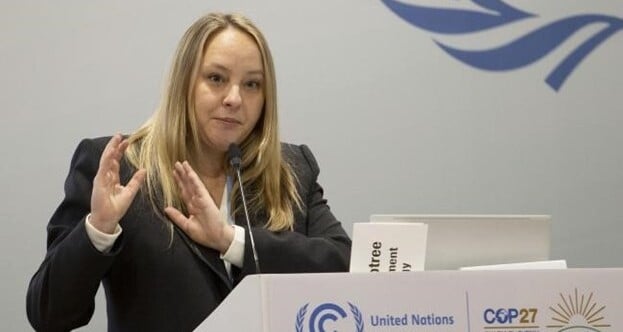What a difference a year makes! For me personally, the last year has been full of change and growth as I was watching CCS from the sidelines and raising my son. My first day “back in the office” was in Egypt at the United Nations’ annual climate change conference, COP27, this past November. It was there, and in the many subsequent meetings that have followed, that I have I seen how our efforts over the past several years to show CCS as a proven technology has resulted in an unprecedented focus on large-scale CCS as a credible part of the path to addressing climate change.
CCS and carbon dioxide removals (CDR) were part of the conversation – no longer a fringe solution or a far-off alternative. I think this change is happening because the world had climate targets to meet, and CCS takes big bites out of emissions. Previously, cost was a major barrier to deployment, but it is the cost of inaction that has now made CCS part of the pathway to net zero for many countries.
I was honoured to represent the Knowledge Centre at COP for the sixth time, and I had the opportunity to team-up with colleagues from Carbon Capture and Storage Association, the Gulf Coast Carbon Center and the IEAGHG Program as part of the CCS delegation to COP27, to share information about the critical role CCS plays in meeting international emissions reduction commitments and to assist countries in developing projects as part of their climate change strategies.
I was glad to meet with stakeholders from around the world to share more about what the current landscape of CCS and the new focus of the International CCS Knowledge Centre in providing expert advice to advance the technology. I took part in many panels and meetings, but some notable events at COP27, included:
Carbon Capture and Storage – Where is it in Africa and What Can Be Learned for Emerging Economies.
This was the only official side event on CCS at COP27. It was opened by the Assistant Secretary of Fossil and Carbon Management for the Department of Energy in the US, Brad Crabtree, and included presentations by the CCS delegation and speakers from South Africa, Nigeria and Morocco, highlighting experiences in the Global South in decarbonizing emerging economies through CCS projects, as well as relevant lessons learned in the US, Norway, UK and Canada. I had the opportunity to speak about how CCUS is both appropriate and possible for industrial applications. You can read a summary of the panel discussion in IISD’s Earth Negotiations Bulletin or watch it all on YouTube:
Canadian CCUS Leadership Dinner
The Knowledge Centre, along with Alberta’s Minister of Environment and Protected Areas Sonya Savage, and Emissions Reduction Alberta, were glad to co-host a Canadian CCUS leadership dinner with several Canadian and international CCUS leaders to explore how we can build alliances and expand hands-on expertise within the global CCS/CCUS ecosystem. The dinner focused on how Western Canada is one of the leading suppliers of the responsibly produced energy the world relies on every day, and how, as home to several of the world’s first commercial CCS projects, invaluable derived knowledge can accelerate the next generation of initiatives across heavy emitting industries. The event sparked rich dialogue and focused discussion on what it would take to get CCS projects to final investment decisions, and we look forward to hosting another event of its kind at COP28 in 2023.
CATF Panel on Regional Carbon Capture Strategies
The Knowledge Centre was a panelist on the Clean Air Task Force’s side event panel Regional Carbon Capture Strategies. Given the essential role CCS will play in reducing CO2 emissions and achieving global climate goals, the panel was asked to speak on recent policy breakthroughs in the US, EU, and beyond that have signaled strong support for the technology. It highlighted the fact that in order to unlock the true potential of CCS, countries will need to coordinate with one another on a cross-border and regional level, helping to facilitate the rapid expansion of CCS around the world. The in-depth discussion identified key elements for successful region-centric carbon capture and storage strategies and sought to chart the course for commercializing this critical climate technology globally. You can watch this discussion on YouTube:
Clean Resources Innovation Network (CRIN) Panel
I also had the opportunity to participate in a panel discussion hosted by Calgary based Clean Resources Innovation Network (CRIN) on how multisector collaboration can help accelerate clean resource technology development in Canada. Co-panelists included Rhona Delfrari (Cenovus), John Zhou (Alberta Innovates), Justin Reimer (ERA), Kevin Krausert (Avatar), and Dominic Aquilina (ISED).
The presidency vision for this year’s COP is to move from negotiations and planning to implementation; now is the time for action on the ground. I couldn’t agree more and look forward to engaging in more constructive discussion towards bringing CCS/CCUS projects to life over the course of 2023, including at COP28 in the United Arab Emirates, Nov. 30 – Dec. 12.
